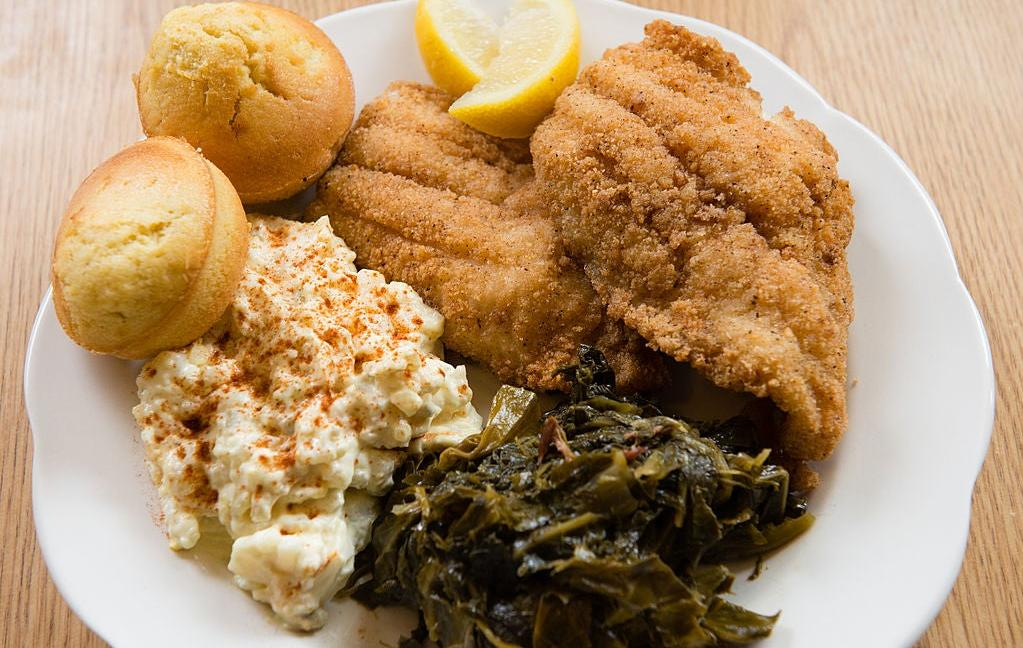On The Enduring Significance Of Potato Salad
From Germany to Aunties Pride and Joy throughout the African American Diaspora
Welcome to Flavor & Soul: A Brief History of African American Food. We'll be taking a closer look at one dish each week and tracing its roots within the African American cooking tradition.
Of all the essential foods present at Juneteenth celebrations and Black cookouts, potato salad is the most contentious. The barbecue can be grilled to perfection, the cornbread can be fluffy and the greens packed with flavor, but if the potato salad is not right—like, say, if there are walnuts, raisins, or olives in it—your cookout is officially a failure. There is a reason that potato salad is an entire meme category. (Google "aunt potato salad meme" and prepare to cackle.) Because potato salad recipes are passed down through generations and vary widely, each serving of this seemingly simple side dish reflects the family history and culinary know-how of its maker. A good potato salad can happily fill up hungry guests when most of the barbecue is gone. The ubiquitous cookout question "Who made the potato salad?" reveals not just who brought it, but how it was made and exactly what's in it. Considerations of taste, food safety, and familial pride are scooped up with every creamy mouthful.
I don't eat random potato salad, so I have never had to ask who made the one I'm eating. My aunt was a noted cook, and her potato salad was the basis from which I judge all others. She boiled redskin potatoes so that they were soft but still formed firm chunks and she mixed them with Hellman's mayo, eggs, green peppers, onions, mustard, and sweet pickles. The all-important sprinkling of paprika covered the bowl of yellow deliciousness. Her potato salad was creamy and dense, with a satisfying vinegary punch. It was so savory and good that I'd eat paper plates of it just by itself, with no need for any of the meat, greens, or cornbread present on the table.
If someone's potato salad looks mushy, too white with no signs of peppers or paprika, I don't go near it. I also won't consider a salad that's not in a portable freezer or packed on ice. My aunt would cut her eyes at anyone who dared serve potato salad without the proper refrigeration. The possibility of food poisoning is another one of the underlying reasons for the question, "Who made the potato salad?" Mayo and eggs sitting out in the sun is one quick way to create a cookout disaster.
But the fact that mayo and potatoes are even included in traditional African American meals has always puzzled me. None of these ingredients have African roots and potato salad itself is a decidedly European dish; I have seen versions in Germany, Spain, Britain, and France. Recipes for mayo-based potato salad didn't even appear in Southern cookbooks here in the United States until the early 20th century, and that was after commercial, pasteurized mayo was invented. So how did potato salad become such a soul food staple?
According to African American food historian Adrian Miller, German immigrants who migrated to the South during the 1860s brought their potato salad recipes with them. These new Southern residents formed close connections to African Americans and shared their potato salad recipes, which developed into a beloved dish for many Black families. The recipes were passed down in families and adjusted by region and taste preferences. For instance, a Southern cook will almost always use Duke's mayo and sweet relish, which might not appeal to non-Southerners. Meanwhile, a Northern cook might incorporate dill and sour cream, which is frowned upon by some. But in all its variations, potato salad became a prominent feature for cookouts and big celebrations because it can be prepared cheaply for large numbers of people and it's filling.
My mother has taken up the mantle as my family's potato salad maker. Besides the perfect ingredients, she blends the memories of generations into each bowl. And that includes a well-packed portable freezer because the memory of my aunt's side-eye remains a clear image in our minds.
